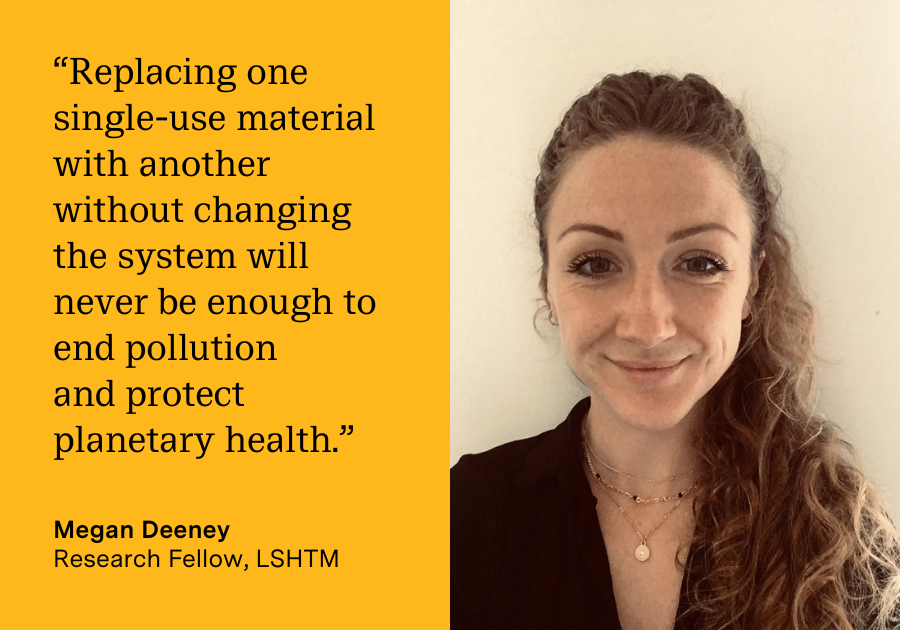
Pollution and climate change are two of the most pressing environmental challenges facing society, deeply interconnected yet often discussed in isolation. While high-profile debates about plastic straws and other single-use items have drawn public attention, the issue extends far beyond consumer choices. The entire life cycle of plastic, from its fossil-fuel-based production to its persistence in landfills and oceans, contributes significantly to greenhouse gas emissions, adverse human health effects and ecosystem degradation.
As the world faces the increasing impacts of the climate and environmental crises, experts from the London School of Hygiene & Tropical Medicine (LSHTM) call for a fundamental shift in mindset: reduce, don’t replace. They suggest that the debate around plastic substitutes is symptomatic of a much broader issue – the global dependence on disposable materials. Without reducing overall production and consumption, simply switching materials risks unintended consequences and harm to the environment and human health.
A recent article, led by researchers from LSHTM, emphasises that ending plastic pollution is a global health imperative. The piece, published in The BMJ, highlights the growing body of evidence demonstrating the health impacts of plastic at every stage of its life cycle, from design and production to disposal.
From the 16,000 plastic chemicals that leach into soils, aquatic environments and food, to the micro- and nanoplastics documented in all corners of the world and throughout human bodies – the scale of exposure is entering uncharted territory, raising urgent concerns about long-term health consequences.
In 2022, 175 member states of the United Nations adopted a resolution to develop a legally-binding ‘Global Plastics Treaty’ to end plastic pollution. This landmark agreement promising global cooperation and ambition reflected widespread recognition that plastic pollution has reached a crisis point for both people and planet.
Negotiations are ongoing in 2025. Scientists call for a full life cycle approach to ending plastics pollution that includes global, legally binding obligations to reduce plastics production, chemical simplification of plastics and mandatory transparency across plastics life cycles. However, according to the BMJ article, industry lobbying, particularly from fossil fuel and plastics corporations, threatens ambitious policies aimed at curbing plastic pollution. Without addressing corporate influence, authors warn that the treaty risks being watered down into a symbolic effort rather than a transformative policy shift.
Policymakers and the public are asking about alternatives and substitutes for plastics. Can they be safer, more sustainable? Replacing plastic with paper straws might present some benefits, but if the end result is vastly more paper straws (some even shown to contain toxic chemicals) – LSHTM experts suggest this could be substituting one problem for another.
Rather than replacing plastics with alternative materials, identifying which plastic products are truly necessary for society could be the fastest and most effective way to reduce plastic production, consumption, and pollution.
Megan Deeney, Research Fellow at LSHTM and lead author on The BMJ article, said: “Science shows that we need to drastically cut plastics production and consumption in order to end plastics pollution and its harms to the environment and human health.
“We need to ask, what can we do without? Replacing one single-use material with another without changing the systems of mass production, use and disposal will never be enough to end pollution and protect human and planetary health, and it can lead to unintended consequences.”
Beyond packaging and products, plastics have enabled the rise of ultra-processed foods (UPFs), which pose both environmental and health risks. A recent comment piece led by LSHTM explores the co-dependence of the plastics and UPF industries, where cheap, functional plastics facilitate mass production and distribution of UPFs worldwide. The authors raise an important question: should public health and environmental efforts focus solely on reducing plastic packaging, or should they also challenge the systems that drive excessive consumption of UPFs?
Joe Yates, Co-Director of the Agriculture, Nutrition & Health (ANH) Academy at LSHTM and co-author on both articles, highlights the urgency of tackling plastic dependency at its source. He said: “Plastics production is unequivocally driving plastic pollution, but our relationship with these materials as a society is complicated. Evidence suggests that just 11% of plastics are recycled globally, and recycling cannot and will not safely and sustainably keep up with the projected growth of these materials.
“It’s fair to say that to protect human health and the planet on which we depend, we need to decrease our reliance on plastics – and rapidly. As we urgently navigate the pressing human and planetary health challenge of plastic pollution, avoiding ‘regrettable’ or ‘false solutions’ will be paramount.
“We need to look beyond surface-level debates and address the broader issue. Stronger regulations, corporate accountability, and shifts in consumption are all key to tackling the plastic pollution crisis.”
Publication:
Megan Deeney et al. Ending pollution and health harms from plastics. The BMJ. DOI: https://doi.org/10.1136/bmj.r71
If you enjoyed this article and would like to build a career in global health, we offer a range of MSc programmes covering health and data, infectious and tropical diseases, population health, and public health and policy.
Available on campus or online, including flexible study that works around your work and home life, be part of a global community at the UK's no.1 public health university.
